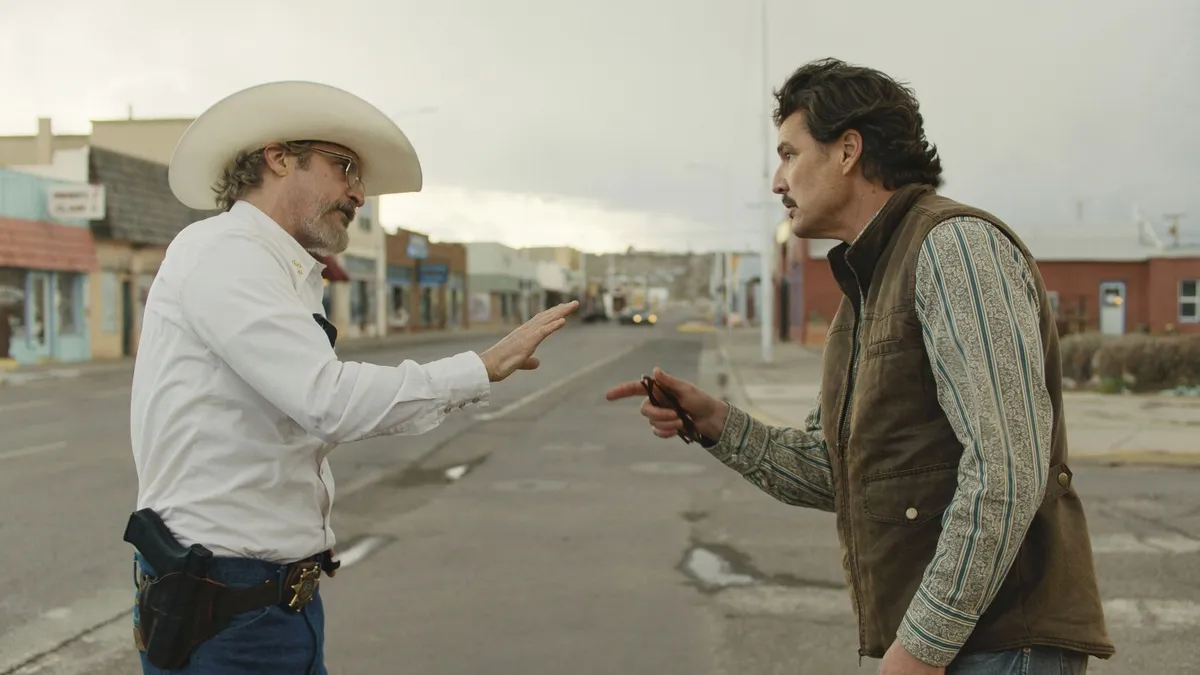
A Post-it note served as a reminder for Ari Aster while crafting his latest film, “Eddington,” with the simple instruction: “Remember the phones.” Although “Eddington” is framed within the context of the pandemic, the onset of COVID-19 is not its primary focus. The story unfolds in a fictional town in New Mexico, where a data center is under construction. Within Eddington, the townspeople are increasingly disconnected, their realities distorted by the pervasive influence of the internet, social media, and smartphones. Aster poignantly observes, “We’re living in such a weird time and we forget how weird it is. Ever since we began living in the internet, things have gotten weirder and weirder.”
Audiences have grown accustomed to the peculiarities present in Aster’s body of work. His previous films, including “Hereditary,” “Midsommar,” and “Beau Is Afraid,” have explored dark realms of fear and anxiety. “Eddington,” set for theatrical release by A24, is poised to be one of the most significant American films addressing the current social and political division in the United States. The narrative features a clash between Joaquin Phoenix’s bumbling right-wing sheriff and Pedro Pascal’s elitist liberal mayor, where debates over mask mandates, Black Lives Matter protests, and elections culminate in a surreal Western fever dream.
In a cinematic landscape often dominated by escapism and nostalgia, “Eddington” courageously attempts to diagnose a contemporary malaise. Aster reflects on his motivation, stating, “To not be talking about it is insane. I’m desperate for work that’s wrestling with this moment because I don’t know where we are.”
Since its debut at the Cannes Film Festival, “Eddington” has elicited a polarized response. Aster acknowledges the mixed reception, remarking, “I don’t know what you think,” when addressing the audience. Critiques have surfaced, suggesting that the film's satire leans heavily against the left. Justin Chang from The New Yorker noted, “Despite a pose of satirical neutrality, he mainly seems to want to score points off mask-wearers and young progressives.” In contrast, The New York Times’ Manohla Dargis commented that while Aster grabs attention, he may be missing the mark in his commentary on America.
Despite the critique, Aster anticipated such reactions. He defends his portrayal, stating, “I heard one person say it was harder on the left than the right, and I think that’s pretty disingenuous.” He believes both sides are portrayed as flawed, with one side being hypocritical while the other is destructive. “If there’s no self-reflection,” Aster emphasizes, “how are we ever going to get out of this?”
Aster began writing “Eddington” in June 2020, inspired by his childhood experiences in New Mexico. He aimed to encapsulate the disconnect that existed long before the pandemic but reached a surreal peak during that time. He describes the film as a modern Western, replacing guns with smartphones while still incorporating traditional firearms. “The dread I was living with suddenly intensified,” Aster recalls, expressing a desire to encapsulate “what was in the air.”
In today’s corporate Hollywood, films that delve into politics are rare. Many studios shy away from distributing politically charged narratives, yet A24 has supported Aster, even after his previous film, “Beau Is Afraid,” struggled at the box office. A24 has a history of engaging with political themes, as seen in last year's speculative war drama, “Civil War.” Aster’s compelling screenplay resonated with actors Phoenix and Pascal, both of whom are keenly aware of the film's contemporary significance.
Since the production of “Eddington” in 2024, the political landscape in America has shifted dramatically, particularly with the second administration of Donald Trump. Aster admits that had he anticipated these changes, he might have made the film even more “obscene” and “angrier.” He describes the current atmosphere as one of “total obscenity,” surpassing anything he has previously witnessed.
“Eddington” is crafted to provoke discussion. While some viewers may appreciate its insightful first half, they might find the violent absurdism of the second half challenging. Aster explains that the film shifts midway, becoming paranoid as it grapples with conflicting worldviews. Despite its complexity, Aster believes films like “Eddington” are crucial; they confront contemporary issues head-on rather than shying away in metaphor.
Aster remains deeply affected by the current state of society, expressing a longing to explore these feelings through his work. He poses a thought-provoking question: “What would an olive branch look like? How do we find a way to reengage with each other?” As “Eddington” prepares for its release, it stands as a testament to the importance of cinematic exploration in understanding and navigating the complexities of our modern world.